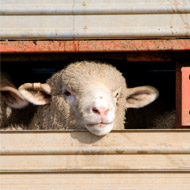BVA calls for comprehensive approach to welfare during transport

BVA recommends that any proposals to improve welfare should embrace all forms of transport.
The BVA has called on the government to put animal welfare at the heart of any changes with regards to moving livestock inside and outside of the UK.
In an updated position statement, the BVA emphasises its support of current UK legislation, stating that it would like to see improved implementation of current laws. The Association says that it welcomes improvements which are informed by a welfare outcomes approach, but stresses that these should be evidence-based.
BVA recommends that any proposals to improve welfare should embrace all forms of transport, and include welfare issues before, during and after movement. The Association says this would help to ensure that a well-defined set of animal welfare standards are met for the entirety of any journey.
It also recommends that animals are slaughtered as close to the point of production as possible and supports the exploration of further opportunities which would assist this.
The Association acknowledges that transportation of live animals can be unavoidable in certain situations, such as journeys between the Scottish Islands and Highlands. However, it notes that no animal should be exported to a destination with unknown welfare standards, to one using systems currently banned in the UK, or to a country where it would be slaughtered without stunning.
BVA President Simon Doherty said: “Any kind of movement has the potential to impact on an animal’s health and welfare. Ideally, we’d like to see livestock slaughtered close to the point of production, as long as all legislative health and welfare standards can be maintained. However, we recognise the high standards of welfare in the UK and support better implementation of current legislation.
“We have taken care to reiterate that any improvements made to live animal transport should consider welfare issues before, during and after movement so that a more complete approach is taken on this issue.”
He continued: “We recognise that journey length is not the only influencer of welfare conditions for animals, and transport needs to be looked at as a whole rather than focusing on single factors. The most important thing for government to do is to consider the evidence base when it weighs up options for making improvements.”



 The latest
The latest